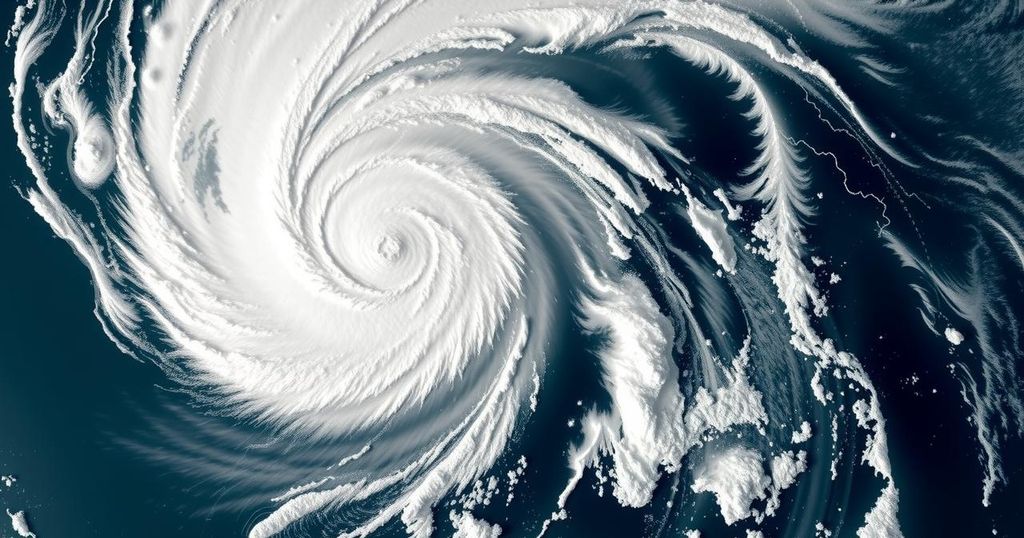Tropical Storm Dikeledi Advances Toward Mozambique Following Devastation in Madagascar and Mayotte

Tropical Storm Dikeledi is moving toward Mozambique, having caused three fatalities in Madagascar and severe flooding in Mayotte. The storm resulted in a continued red alert in Mayotte as residents cope with the impact of recent cyclonic activity, including Cyclone Chido. Despite the storm’s weakening status, heavy rainfall and strong winds remain a concern, prompting extensive mobilization of emergency services in the region.
Tropical Storm Dikeledi has intensified while moving toward Mozambique after causing significant destruction in Madagascar and Mayotte. The storm has tragically claimed three lives in Madagascar and left Mayotte impacted by strong winds and heavy rainfall. Mayotte’s authorities have maintained a red alert to ensure safety following prior devastation from Cyclone Chido, which had resulted in considerable casualties and damage. Although Dikeledi is now primarily offshore, meteorological forecasts indicate it may strengthen further before landfall.
The storm, upon hitting Madagascar as a cyclone on Saturday, unleashed powerful winds and torrential rain, leading to its current status as a severe tropical storm. The Prefect of Mayotte, Francois-Xavier Bieuville, has stated that despite the reduced intensity of Dikeledi, the red alert will remain in effect as precaution against continuing adverse weather conditions. In Mayotte, there are reports of destruction to homes, particularly in the southern region, with emergency services confirming substantial inundation in several villages.
Residents of Mayotte express deep concern and anxiety as they cope with the aftermath of multiple storms within a short period. Officials have mobilized over 4,000 personnel to assist in recovery efforts and provide shelter to those affected, although some residents have disregarded the travel ban and ventured outside, seeking to address personal concerns amid the storm. As Dikeledi approaches the coast of Mozambique, serious warnings remain in place regarding inclement weather and unsafe sea conditions.
The cyclones observed in this region usually occur from November to March, and this year, surface temperatures are nearing 30 degrees Celsius, contributing to storm intensity, a matter exacerbated by climate change. The threat posed by Dikeledi highlights ongoing vulnerabilities faced by communities in the Indian Ocean region, as heightened storm activity becomes an increasingly common phenomenon.
This article discusses the ongoing impact of Tropical Storm Dikeledi on Madagascar and Mayotte, following the recent devastation caused by Cyclone Chido. The region has been experiencing a high frequency of tropical storms and cyclones, primarily from November to March each year. The current conditions are worsened by elevated surface temperatures in the Indian Ocean, which can lead to more intense storms. Dikeledi’s path reflects the broader context of climate change and its implications on storm severity and frequency in vulnerable maritime communities. Both Madagascar and Mayotte have faced significant challenges recently, with the latter having declared a red alert due to the threat of strong winds and heavy rain. The capacity of local emergency services has been tested as communities work to recover from previous natural disasters, indicating a systemic vulnerability that requires proactive measures and preparedness in the face of climate aggravation.
In summary, Tropical Storm Dikeledi poses an immediate threat to the already vulnerable regions of Madagascar and Mayotte, where recent storms have left communities in distress. The potential intensification of Dikeledi as it moves toward Mozambique underscores the necessity for vigilant monitoring and response efforts. As climate change continues to influence weather patterns, the frequency and strength of such storms will likely increase, challenging local authorities and emergency services to adapt and prepare more effectively for future incidents.
Original Source: www.cbs19news.com






